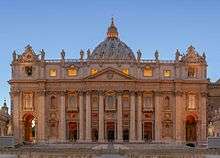Ecclesial community
An ecclesial community is, in the terminology used by the Catholic Church, a Christian religious group that does not meet the Catholic definition of a "Church." Although the word "ecclesial" itself means "church" or "gathering" in a political sense in Koine Greek, the Catholic Church applies the term "Church" in the proper sense only to Christian communities that, in the Catholic Church's view, "have true sacraments and above all – because of the apostolic succession – the priesthood and the Eucharist."[1]
| Part of a series on the |
| Catholic Church |
|---|
 |
| Overview |
|
Miscellaneous
Relations with: |
|
|
The Catholic Church formally recognizes as "Churches" of a nature similar to its own particular Churches (dioceses and autonomous or sui iuris Churches) the Eastern Churches separated from full communion with it,[1] namely those of Eastern Orthodoxy, Oriental Orthodoxy, and Church of the East. It has not denied the claim of some communities of Western Christianity to meet its definition of "Church" (an example is the Polish National Catholic Church). Indeed, by referring to "The Separated Churches and Ecclesial Communities in the West,"[2] the Second Vatican Council recognized the existence of some Western Churches that are not in full communion with the Holy See.
However, the Catholic Church expressly excludes "those Christian communities born out of the Reformation of the sixteenth century," since, according to Catholic doctrine, these communities do not enjoy apostolic succession in the sacrament of orders, and therefore lack a constitutive element of the Church.[3] This includes the Anglican Communion, the validity of whose orders (particularly their 'sacerdotal' priesthood) and consequently of whose supposedly Holy Eucharist the Church has declared "absolutely null and utterly void." This judgement, as enunciated in the papal bull Apostolicae curae of 1896, has been given as an example of a truth connected to revelation that is to be held definitively.[4]
Criticism of the label
After Pope Benedict XVI promulgated the document Dominus Iesus in 2000, several leaders from the Church of Denmark replied in a public statement, saying in part,[5]
However, it has a destructive effect on ecumenical relations if one church deprives another church of the right to be called a church. It is just as destructive as if one Christian denies another Christian the right to be called a Christian.
Ecclesial Communities in Formation
Other forms of the term ecclesial community refers to those communities that are in formation to become missions of a particular church or parishes of a particular diocese, or eparchy. Ecclesial communities can refer to groups of individuals who gather for a spiritual reason, primarily for worship and fellowship that typically does not receive sacraments unless a sacramental minister, i.e a Priest or Deacon,is available.
References
- Responses to Some Questions regarding Certain Aspects of the Doctrine of the Church, Fourth Question Archived August 13, 2013, at the Wayback Machine
- Unitatis redintegratio, 19 Archived March 6, 2013, at the Wayback Machine
- Responses to Some Questions regarding Certain Aspects of the Doctrine of the Church, Fifth Question Archived August 13, 2013, at the Wayback Machine
- Doctrinal Commentary on the Concluding Formula of the Professio Fidei, 29 June 1998
- Evangelical Lutheran Church in Denmark's reply to the Catholic Church